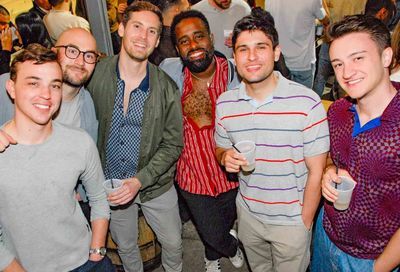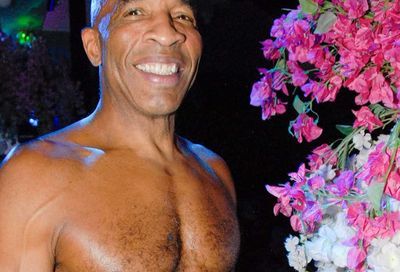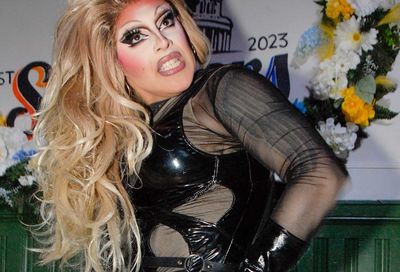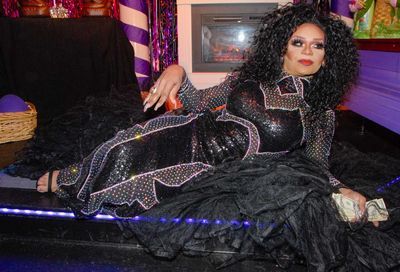Cultural Crossroads: An interview with LHP’s David Perez
LHP's David Perez on coming out, finding self-acceptance and the importance of forging a historical heritage within a broader culture
sure that folks can also express their Latino identity, and, of course, invite allies into the space who love Latino culture, it was just a real unique and fulfilling experience.
MW: Sometimes, in Latino culture, there can be divisions between various subgroups. Do you find that as LGBT Latinos, there’s more acceptance among people from different backgrounds?
PEREZ: I would say human beings are human beings, regardless of what space you’re in. I would say that there is definitely, in the queer community and the work I’ve done here in D.C., an acknowledgement of ostracism and the negative experiences folks have gone through, so creating a space that includes everyone is of high value. After our Pride march, we did a debrief with our group, and we were actually talking about Stonewall, about Sylvia Rivera and activists who were there at the beginning, and why we started this movement. And so we need to remember to be inclusive of all those expressions during Pride. I know at LHP, we’ve tried to do that.
About three years ago, we had to take stock of what groups are underrepresented in some of our educational content or in our group meetings, and make initiatives to address each of those diversities. So we identified four or five priority populations that we wanted to see more of in our work. We founded the Women’s Committee that hosts the annual Women’s History Month for the lesbian-focused event. We also looked at youth populations, Afro-Latino, new immigrant populations, transgender people. And we tried to create different initiatives that each group could come up with their own ideas and implement those.

MW: After the 1991 riots in Mount Pleasant, there was an acknowledgement under former Mayor Sharon Pratt Kelly that there was a need to reach out to the Latino community in the District. Do you think that the District, with the Office of Latino Affairs today, has forged a better relationship with the Latino community?
PEREZ: Well, I moved to Washington, D.C. nine years ago, so that’s as long as I’ve been here. I would say that the Office of Latino Affairs is at the height of working collaboratively with the LGBT community. Last year, LHP awarded OLA’s director, Roxana Olivas, with her first ally award. I’ve never seen another director who’s taken steps to include the LGBT community so much in the Office of Latino Affairs. She created the LGBT Latino Task Force, which is a coalition of the different LGBT Latino groups and service groups in D.C., to say, “How can the Office of Latino Affairs help you?” Also, when there’s been any hate crime issues, she’s right away come to address those issues. She’s given me personal calls on several occasions about young people that have experienced discrimination or have a need, and we try to see what resources are in the community that we can pull together to help these students.
But what stuck out to me was the Office of Latino Affairs really took interest in supporting those folks. They invited the Office of GLBT Affairs to the task force meetings. And really started to say: how can we communicate as government agencies, we know there’s this population being discriminated against for multiple identities, and we need to work collaboratively. I’d never seen somebody start a task force, and promote and attend all our events, connect us with resources, and ensure that the LGBT Latino community was noticed in all the Latino events hosted by her office.
Apple’s gold Watch could cost $5,000
MW: Do you think the next mayor, regardless of who it is, should keep Roxana Olivas on as director?
PEREZ: I think Roxana Olivas is amazing. We would love to have her serving us in that capacity or in other positions in the government where she can have an impact. She is a very honest woman, she holds people accountable, but she is also a very compassionate woman. If any person is in distress, she’ll make a call and find out how we can help that person. She’s a great leader that has made sure the services of that office go to every District resident, including LGBT Latinos, so we are not left out.
MW: Tell me about Hispanic Heritage Month.
PEREZ: During Hispanic Heritage Month, there’s so many events in D.C., right? Local and national events, all about Hispanic Heritage Month. Very few of those events, if any, have a particular focus on being queer and Latino. So this was created for that. One is the educational component, with our exhibit, one is honoring our leaders, and then just raising the greater visibility of the folks in our community. So at the Hispanic LGBTQ Heritage Awards on Sept. 12, we honored Lena Hernandez, who will receive our Latino Leadership Award, who works for D&P Creative Strategies, a consulting firm in D.C. that works with a lot of Hispanic organizations, national groups and organizations. She’s been on the SMYAL [Supporting and Mentoring Youth Advocates and Leaders] board, she’s volunteered with LAYC [Latin American Youth Center], and she’s on the board of Latinas Leading Tomorrow, which works with young Latinas in leadership. She’s also been integral in Women’s History Month, now in its third year, which has been a great way to get more women involved in the organization.
We’re also really excited about Gabriela Garcia. She has been a longtime health educator and trans advocate. She’s been more behind-the-scenes, so we’re excited about this opportunity to honor her. She was one of the founding members of what was called “Creando Espacios” which was a trans women’s support group at La Clinica del Pueblo, in the mid-2000s. Now it’s changed names to Mariposas. She and her husband took time and created a small business away from activism, but just last year, she started a new trans support group at NovaSalud in Northern Virginia called TSISTA [Transgender Sisters Informing Sisters About Topics on AIDS].
The third one we honored is Ruben Gonzales. He currently works for United Cerebral Palsy as a chief development officer. His last most recent job was with National Council of La Raza, where he was a deputy vice president for resource development. And not only has he been great about giving advice to the queer Latino movement about fundraising, but he, at La Raza, was leading on their LGBT advocacy statements, new programming that included LGBT leaders, so he was really one of the main points of contact there, helping to lead that work. He was also named one of The Advocate‘s “40 Under 40” a few years ago.
MW: What else do you have planned for LHP this year?
PEREZ: Each year, it’s been a little different, but there are several events and components going on. I would love to expand and create more spaces. LHP, since it was founded in 2000, has been 100 percent volunteer-run until this year, when we have a part-time staff person. It’s a very limited amount of time, but Jesus Chavez is doing amazing work with the limited number of hours he has. So I think the more volunteer power we have, the more we can expand.
Right now, we have a couple of events going on. So this is our big launch, Hispanic Heritage Month. Next, we’re going to be installing two large posters that will be on display at four locations from the start of Hispanic Heritage Month, all the way through LGBT History Month, which ends Oct. 31. So members of the public going through these spaces can see at The DC Center, the Mayor’s Office of Latino Affairs, at the Mount Pleasant Library, and the Latin American Youth Center, these posters, which will be able to educate communities throughout these different areas.
Our founder, Jose Gutierrez, will be speaking at a panel on Sept. 27, at the Historical Society of Washington, D.C. It’s a panel about Metropolitan Washington, D.C.’s Latino community, and the history of the community, and, of course, he’ll be speaking to the queer community. Later, there will be a presentation, a panel I’m going to be on, it’s Peace Corps employees who are invited, local activists, somebody from HRC, myself and Alexa Rodriguez from La Clinica del Pueblo to talk about the intersections of being queer and Latino, and they have new policies about being more LGBT-inclusive, so they want to hear about some of the work of activists.
We have the Facebook Heroes Latinos LGBTQ exhibition, so all these 90 photos will be released, several each week, on Facebook, to build up the hype for Hispanic Heritage Month and LGBT History Month. In November, for Transgender Awareness Month, we will be bringing Bamby Salcedo to Washington, D.C. She’s a trans activist from L.A., there’s a documentary about her called Transvisible. So that will be Nov. 8 at the Mount Pleasant Library, a screening of the film and a panel with herself and the director, Dante Alencastre. And we’re co-hosting that with the Mayor’s LGBT Latino Task Force, which includes many community groups here in D.C.
I think, for me, I’m really passionate about all of this work because I love these spaces where people can just celebrate, where people can just be themselves and walk into a room and be like, “I’m Latino, I’m LGBTQ, and I feel accepted and celebrated in this space,” instead of going to other places and feeling left out. That inspires me. Just to hear from young people who really enjoyed volunteering at an event, to hear longtime activists saying, “We need more of these spaces,” that inspires me to keep going on this work. We have an amazing board of directors and an amazing network of volunteers who help at various events throughout the year. Just everybody working together is really inspiring to keep doing this work.
The Latino GLBT History Project’s “Heroes Latinos LGBTQ” photo exhibition will be posted online through Oct. 31. To view the gallery, visit facebook.com/LatinoGLBTHistory. For more information on LHP, visit latinoglbthistory.org.
Support Metro Weekly’s Journalism
These are challenging times for news organizations. And yet it’s crucial we stay active and provide vital resources and information to both our local readers and the world. So won’t you please take a moment and consider supporting Metro Weekly with a membership? For as little as $5 a month, you can help ensure Metro Weekly magazine and MetroWeekly.com remain free, viable resources as we provide the best, most diverse, culturally-resonant LGBTQ coverage in both the D.C. region and around the world. Memberships come with exclusive perks and discounts, your own personal digital delivery of each week’s magazine (and an archive), access to our Member's Lounge when it launches this fall, and exclusive members-only items like Metro Weekly Membership Mugs and Tote Bags! Check out all our membership levels here and please join us today!





















